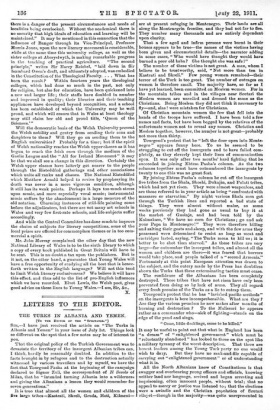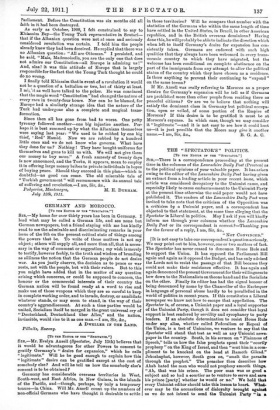LETTERS TO THE EDITOR.
THE TURKS IN ALBANIA AND YEMEN.
[To THE EDIT011 OP THE "SPECTATOR.")
have just received the article on "The Turks in Albania and Yemen" in your issue of July 1st. Things look so different on the spot that a few notes may be of interest to you.
That the original policy of the Turkish Government was to devastate the territory of the insurgent Albanian tribes can, I think, hardly be reasonably doubted. In addition to the facts brought in by refugees and to the destruction actually witnessed by various travellers and by myself, we have the fact that Tourgoud Pasha at the beginning of the campaign declared to Signor Zuhi, the correspondent of II Secolo of Milan, that he "intended turning Albania into a wilderness and giving the Albanians a lesson they would remember for seven generations."
It is true that almost all the women and children of the Ave large tribes —Kastrati, Skreli, Crude, Hoti, Kilraeni-
are at present refuging in Montenegro. Their lands are all along the Montenegrin frontier, and they had not far to flee. They number many thousands and are entirely dependent upon charity.
That a few aged and infirm persons were burnt in their houses appears to be true—the names of the victims having been given and circumstantial details—the narrator adding in some cases, "Who would have thought they would have burned a poor old baba? She thought she was safe!"
The number of these victims is not great. A man, whom I believe to be trustworthy, said, "Not more than ten in Kastrati and Skreli." Few young women remained—their terror of the Turk is too great. The number of outrages on women is therefore smalL The majority have, so far as I have yet learned, been committed on Moslem women. For in the mountain tribes and in the villages near Scutari the Moslem women are unveiled and dressed the same as the Christians. Being Moslem they did not think it necessary to fly—and, alas ! were mistaken for Christians.
Of Christian mountain women the few that fell into the bands of the troops have suffered. I have been told a few names and facts, but have been begged by the relatives of the unfortunate women not to reveal any names. Christian and Moslem together, however, the number is not great—probably not more than thirty.
Tourgoud's protest that he "left the door open into Monte- negro" appears funny here. To us he seemed to be struggling to cut off the insurgents and to have failed com- pletely, as they cleverly kept their lines of communication open. It was only after two months' hard fighting that he succeeded in joining Ehtem Pasha's column. As the two columns together must have outnumbered the insurgents by twenty to one this was no great feat.
By joining Ehtem Pasha's column he cut off the insurgent five tribes from the Shale, Shoshi, Dukajin, and Pulati tribes, which had not yet risen. They were almost weaponless, and are those referred to in your article as being " confronted with massacre or starvation." By night various Shale men got through the Turkish lines and reported a bad state of things. They were almost without maize, as some weeks previously they had gone as usual to buy it at the market of Gusinje, and had been told by the Kaimakam, "We have no corn for Christians ; go and ask your Papa in Montenegro!" They were therefore killing and salting their goats and sheep, and with the few arms they possessed were determined to resist as long as meat and cartridges lasted, saying, "The Turks mean to kill us ; it is better to be shot than starved." As these tribes are very large—far outnumber the insurgent tribes, and almost all the women and children are there—it was feared that horrors would take place, and people talked of a "second Armenia." Fortunately at this point European attention was drawn to the subject, and the outcry made by the Press has doubtless shown the Turks that these exterminating tactics must cease.
The confidence of the Albanians has been completely destroyed. Those tribes that have not risen have only been prevented from doing so by lack of arms. They all regard every fresh promise of the Turks as a lie to entrap them.
Tourgoud's protest that he has "lavished pacific methods" on the insurgents is here incomprehensible. What are they ? Are they the various promises he now makes after months of burning and destruction P To the Malissori he appears rather as a commander who—sick of fighting—stands on the edge of the pond and sings, "Come, little ducklings, come to be killed."
It may be useful to point out that -what in England has been "a dream" of "enlightened government" which must be "reluctantly abandoned" has looked to those on the spot like a military tyranny of the worst description. That there are honest leaders among the Young Turk party no one would wish to deay. But they have no rank-and-file capable of carrying out "enlightened government" or of understanding what it is.
All the North Albanians know of Constitutions is that swagger and overbearing young officers and officials, knowing neither land nor language, arrived and began arresting and imprisoning, often innocent people, without trial; that no appeal to mercy or justice was listened to ; that the elections were a swindle and the Christian population of Scutari vila3 et—though in the majority—was quite unrepresented in Parliament. Before the Constitution was six months old all faith in it had been destroyed.
As early as October, 1908, I felt constrained to say to Khiassim Bey—the Young Turk representative in Scutari— that if the Albanian question were not at once and seriously considered revolution was certain. I told him the people already knew they had been deceived. He replied that there was no Albanian question: "All are Ottoman." I persisted, and he said, "Mais, Mademoiselle, you are the only one that does not admire our Constitution—all Europe is admiring us !" And, alas ! it was this attitude of Europe that is largely responsible for the fact that the Young Turk thought he could do no wrong.
I finally told Khiassim that in event of a revolution it would not be a question of a battalion or two, but of thirty at least. I mit„'it as well have talked to the poker. He was convinced that the magic word " Constitution " had changed the nature of every race in twenty-four hours. Nor can he be blamed, for Europe had a similarly strange idea that the nature of the Turk had undergone also a complete and magical trans- formation.
Since then all has gone from bad to worse. One petty tyranny followed another—one big injustice another. Per- haps it is best summed up by what the Albanians themselves were saying last year: "We used to be robbed by one big thief, Red' Hanaid. Now we are robbed by a hundred little ones and we do not know who governs. What have they done for us ? Nothing ! They have bought uniforms for themselves and guns to kill us with. We will not give them our money to buy more." A fresh amnesty of twenty days is now announced, and the Turks, it appears, mean to employ it in offering large money bribes to private individuals in hopes of buying peace. Should they succeed in this plan—which is doubtful—no good can come. The old miserable tale of "Turkish government" will recommence with its annual tale of suffering and revolution.—I am, Sir, &c.,







































 Previous page
Previous page